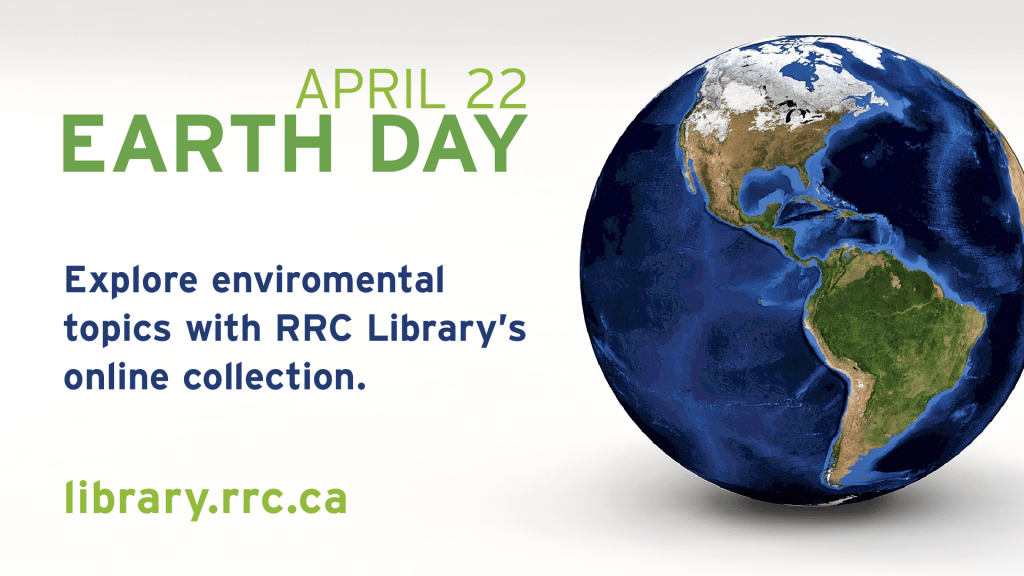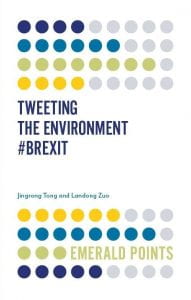Earth Day 2020 #EARTHDAY2020
Earth Day Goes Digital
For the first time in history, Earth Day is going digital. With a theme of CLIMATE ACTION and voices stronger than ever, people across the globe will be rallying on behalf of the planet from their computers. The cries need to be heard for a reason: according to earthday.org, “climate change represents the biggest challenge to the future of humanity and the life-support systems that make our world habitable.” Would you like to be a part of Earth Day Live? To participate in online events, tune into Earth Day Live on Wednesday, April 22.
Sustainability at Red River College
On this Earth Day, we encourage you to read about the inspiring impact the Sustainability department has made at the College. Check it out in their Earth Day blog post.
Explore Environmental Topics From Our Online Library
Explore environmental topics from the comfort of home with our online collection of e-books and streaming videos. Below are some suggestions, but you may want to try entering a keyword in the Library’s OneSearch and see what it brings you. While our physical items are currently unavailable, please remember to use the filter on the sidebar to limit your search results to “Available online.”
E-BOOKS (log in may be required)
Lyme : The First Epidemic of Climate Change
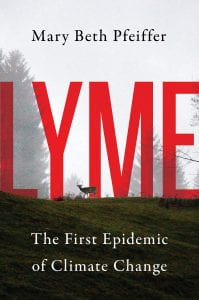 Kirkus Lyme disease is spreading rapidly around the globe as ticks move into places they could not survive before. The first epidemic to emerge in the era of climate change, the disease infects half a million people in the US and Europe each year, and untold multitudes in Canada, China, Russia, and Australia. Mary Beth Pfeiffer shows how we have contributed to this growing menace, and how modern medicine has underestimated its danger. She tells the heart-rending stories of families destroyed by a single tick bite, of children disabled, and of one woman’s tragic choice after an exhaustive search for a cure. Pfeiffer also warns of the emergence of other tick-borne illnesses that make Lyme more difficult to treat and pose their own grave risks. Lyme is an impeccably researched account of an enigmatic disease, making a powerful case for action to fight ticks, heal patients, and recognize humanity’s role in a modern scourge.
Kirkus Lyme disease is spreading rapidly around the globe as ticks move into places they could not survive before. The first epidemic to emerge in the era of climate change, the disease infects half a million people in the US and Europe each year, and untold multitudes in Canada, China, Russia, and Australia. Mary Beth Pfeiffer shows how we have contributed to this growing menace, and how modern medicine has underestimated its danger. She tells the heart-rending stories of families destroyed by a single tick bite, of children disabled, and of one woman’s tragic choice after an exhaustive search for a cure. Pfeiffer also warns of the emergence of other tick-borne illnesses that make Lyme more difficult to treat and pose their own grave risks. Lyme is an impeccably researched account of an enigmatic disease, making a powerful case for action to fight ticks, heal patients, and recognize humanity’s role in a modern scourge.
Being the Change : Live Well and Spark a Climate Revolution
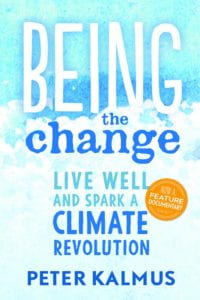 Life on 1/10th the fossil fuels turns out to be awesome. We all want to be happy. Yet as we consume ever more in a frantic bid for happiness, global warming worsens. Alarmed by drastic changes now occurring in the Earth’s climate systems, the author, a climate scientist and suburban father of two, embarked on a journey to change his life and the world. He began by bicycling, growing food, meditating, and making other simple, fulfilling changes. Ultimately, he slashed his climate impact to under a tenth of the US average and became happier in the process. Being the Change explores the connections between our individual daily actions and our collective predicament. It merges science, spirituality, and practical action to develop a satisfying and appropriate response to global warming.
Life on 1/10th the fossil fuels turns out to be awesome. We all want to be happy. Yet as we consume ever more in a frantic bid for happiness, global warming worsens. Alarmed by drastic changes now occurring in the Earth’s climate systems, the author, a climate scientist and suburban father of two, embarked on a journey to change his life and the world. He began by bicycling, growing food, meditating, and making other simple, fulfilling changes. Ultimately, he slashed his climate impact to under a tenth of the US average and became happier in the process. Being the Change explores the connections between our individual daily actions and our collective predicament. It merges science, spirituality, and practical action to develop a satisfying and appropriate response to global warming.
To Master the Boundless Sea : The U.S. Navy, the Marine Environment, and the Cartography of Empire
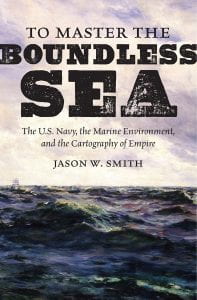 Beginning in the early nineteenth century and concluding in the first years of the twentieth, Jason W. Smith tells the story of the rise of the U.S. Navy and the emergence of American ocean empire through its struggle to control nature. In vividly told sketches of exploration, naval officers, war, and, most significantly, the ocean environment, Smith draws together insights from environmental, maritime, military, and naval history, and the history of science and cartography, placing the U.S. Navy’s scientific efforts within a broader cultural context. By recasting and deepening our understanding of the U.S. Navy and the United States at sea, Smith brings to the fore the overlooked work of naval hydrographers, surveyors, and cartographers. In the nautical chart’s soundings, names, symbols, and embedded narratives, Smith recounts the largely untold story of a young nation looking to extend its power over the boundless sea.
Beginning in the early nineteenth century and concluding in the first years of the twentieth, Jason W. Smith tells the story of the rise of the U.S. Navy and the emergence of American ocean empire through its struggle to control nature. In vividly told sketches of exploration, naval officers, war, and, most significantly, the ocean environment, Smith draws together insights from environmental, maritime, military, and naval history, and the history of science and cartography, placing the U.S. Navy’s scientific efforts within a broader cultural context. By recasting and deepening our understanding of the U.S. Navy and the United States at sea, Smith brings to the fore the overlooked work of naval hydrographers, surveyors, and cartographers. In the nautical chart’s soundings, names, symbols, and embedded narratives, Smith recounts the largely untold story of a young nation looking to extend its power over the boundless sea.
Coping with the Climate Crisis : Mitigation Policies and Global Coordination
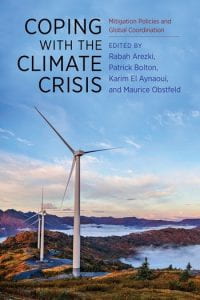 Reducing carbon emissions is the most complex political and economic problem humanity has ever confronted. Coping with the Climate Crisis brings together leading experts from academia and policy circles to explore issues related to the implementation of the COP21 Paris Agreement and the challenges of accelerating the transition toward sustainable development. The book synthesizes the key insights that emerge from the latest research in climate-change economics in an accessible and useful guide for policy makers and researchers. Contributors consider a wide range of issues, including the economic implications and realities of shifting away from fossil fuels, the role of financial markets in incentivizing development and construction of sustainable infrastructure, the challenges of evaluating the well-being of future generations, the risk associated with uncertainty surrounding the pace of climate change, and how to make climate agreements enforceable.
Reducing carbon emissions is the most complex political and economic problem humanity has ever confronted. Coping with the Climate Crisis brings together leading experts from academia and policy circles to explore issues related to the implementation of the COP21 Paris Agreement and the challenges of accelerating the transition toward sustainable development. The book synthesizes the key insights that emerge from the latest research in climate-change economics in an accessible and useful guide for policy makers and researchers. Contributors consider a wide range of issues, including the economic implications and realities of shifting away from fossil fuels, the role of financial markets in incentivizing development and construction of sustainable infrastructure, the challenges of evaluating the well-being of future generations, the risk associated with uncertainty surrounding the pace of climate change, and how to make climate agreements enforceable.
Why Are We Waiting? : The Logic, Urgency, and Promise of Tackling Climate Change
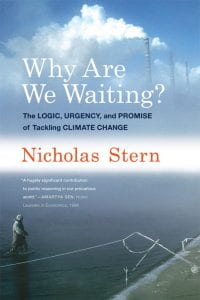 An urgent case for climate change action that forcefully sets out, in economic, ethical, and political terms, the dangers of delay and the benefits of action. The risks of climate change are potentially immense. The benefits of taking action are also clear: we can see that economic development, reduced emissions, and creative adaptation go hand in hand. A committed and strong low-carbon transition could trigger a new wave of economic and technological transformation and investment, a new era of global and sustainable prosperity. Why, then, are we waiting? In this book, Nicholas Stern explains why, notwithstanding the great attractions of a new path, it has been so difficult to tackle climate change effectively. He makes a compelling case for climate action now and sets out the forms that action should take. Stern argues that the risks and costs of climate change are worse than estimated in the landmark Stern Review in 2006—and far worse than implied by standard economic models. He reminds us that we have a choice.
An urgent case for climate change action that forcefully sets out, in economic, ethical, and political terms, the dangers of delay and the benefits of action. The risks of climate change are potentially immense. The benefits of taking action are also clear: we can see that economic development, reduced emissions, and creative adaptation go hand in hand. A committed and strong low-carbon transition could trigger a new wave of economic and technological transformation and investment, a new era of global and sustainable prosperity. Why, then, are we waiting? In this book, Nicholas Stern explains why, notwithstanding the great attractions of a new path, it has been so difficult to tackle climate change effectively. He makes a compelling case for climate action now and sets out the forms that action should take. Stern argues that the risks and costs of climate change are worse than estimated in the landmark Stern Review in 2006—and far worse than implied by standard economic models. He reminds us that we have a choice.
-
Climate Shock : The Economic Consequences of a Hotter Planet
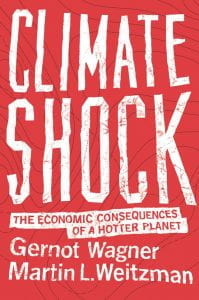 If you had a 10 percent chance of having a fatal car accident, you’d take necessary precautions. If your finances had a 10 percent chance of suffering a severe loss, you’d reevaluate your assets. So if we know the world is warming and there’s a 10 percent chance this might eventually lead to a catastrophe beyond anything we could imagine, why aren’t we doing more about climate change right now? We insure our lives against an uncertain future–why not our planet? In Climate Shock, Gernot Wagner and Martin Weitzman explore in lively, clear terms the likely repercussions of a hotter planet, drawing on and expanding from work previously unavailable to general audiences. They show that the longer we wait to act, the more likely an extreme event will happen. A city might go underwater. A rogue nation might shoot particles into the Earth’s atmosphere, geoengineering cooler temperatures. Zeroing in on the unknown extreme risks that may yet dwarf all else, the authors look at how economic forces that make sensible climate policies difficult to enact, make radical would-be fixes like geoengineering all the more probable.
If you had a 10 percent chance of having a fatal car accident, you’d take necessary precautions. If your finances had a 10 percent chance of suffering a severe loss, you’d reevaluate your assets. So if we know the world is warming and there’s a 10 percent chance this might eventually lead to a catastrophe beyond anything we could imagine, why aren’t we doing more about climate change right now? We insure our lives against an uncertain future–why not our planet? In Climate Shock, Gernot Wagner and Martin Weitzman explore in lively, clear terms the likely repercussions of a hotter planet, drawing on and expanding from work previously unavailable to general audiences. They show that the longer we wait to act, the more likely an extreme event will happen. A city might go underwater. A rogue nation might shoot particles into the Earth’s atmosphere, geoengineering cooler temperatures. Zeroing in on the unknown extreme risks that may yet dwarf all else, the authors look at how economic forces that make sensible climate policies difficult to enact, make radical would-be fixes like geoengineering all the more probable.
Tweeting the Environment #Brexit
The level of politicisation of the environment has been low in the UK. Economic concerns outweigh environmental ones in political debates, public policies and political agendas. Can the rise of social media communication change this situation? Tweeting the Environment #Brexit argues that, although limited by the dynamics of the British context, the technological affordances of Twitter enabled social actors such as the Green Party, ENGOs, and their associates to advance their political and green claims in order to mobilise voters before the 2016 EU referendum and to express their concerns in order to change environmental politics in the aftermath. The interdisciplinary research employed a combination of big data applications such as ElasticSearch and Kibana and desktop applications such as Gephi and SPSS in analysing large-scale social data. Adopting an inductive and data-driven approach, this book shows the importance of mixed methods and the necessity of narrowing down’big’to’small’data in large-scale social media research.
STREAMING VIDEOS (log in may be required)
An Inconvenient Truth
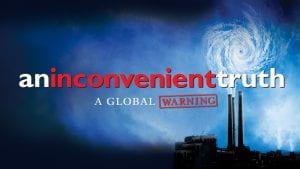 Former Vice President Al Gore explains the facts of global warming, presents arguments that the dangers of global warning have reached the level of crisis, and addresses the efforts of certain interests to discredit the anti-global warming cause. Between lecture segments, Gore discusses his personal commitment to the environment, sharing anecdotes from his experiences.
Former Vice President Al Gore explains the facts of global warming, presents arguments that the dangers of global warning have reached the level of crisis, and addresses the efforts of certain interests to discredit the anti-global warming cause. Between lecture segments, Gore discusses his personal commitment to the environment, sharing anecdotes from his experiences.
We are All Related Here
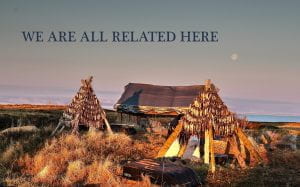 The story of the Yup’ik people, an Indigenous community of Newtok, Alaska, who are being forced to relocate their village due to the erosion and flooding they are experiencing as a result of global warming. We meet some of the people who are being called America’s first ‘climate refugees,’ and learn about the history and culture of the Yup’ik people of Newtok, who are being forced to relocate their village due to the erosion and flooding they are experiencing as a result of global warming.
The story of the Yup’ik people, an Indigenous community of Newtok, Alaska, who are being forced to relocate their village due to the erosion and flooding they are experiencing as a result of global warming. We meet some of the people who are being called America’s first ‘climate refugees,’ and learn about the history and culture of the Yup’ik people of Newtok, who are being forced to relocate their village due to the erosion and flooding they are experiencing as a result of global warming.
Hole Story
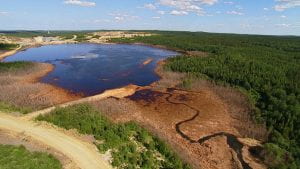 In this feature documentary, Richard Desjardins and Robert Monderie continue in the same provocative vein as their earlier Forest Alert, this time turning their lens on Canada’s mining industry. Using striking images, rare archival footage and interviews, The Hole Story analyzes company profits and the impact of mining on the environment and workers’ health.
In this feature documentary, Richard Desjardins and Robert Monderie continue in the same provocative vein as their earlier Forest Alert, this time turning their lens on Canada’s mining industry. Using striking images, rare archival footage and interviews, The Hole Story analyzes company profits and the impact of mining on the environment and workers’ health.
Into the Fire (Nature of Things)
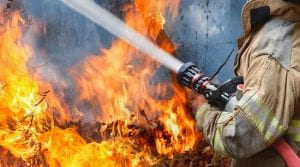 Nature created it. Humans harnessed it. And now, as climate change helps light a flame to our forests, scientists are desperately trying to understand fire. In the summer of 2017, more than one million hectares of the B.C. landscape went up in smoke. In 2016, the Fort McMurray wildfire — known as “the Beast” — forced the evacuation of nearly 90,000 residents. This compelling documentary travels from Alberta to Australia to follow researchers and firefighters as they race to learn from a new generation of massive fires.
Nature created it. Humans harnessed it. And now, as climate change helps light a flame to our forests, scientists are desperately trying to understand fire. In the summer of 2017, more than one million hectares of the B.C. landscape went up in smoke. In 2016, the Fort McMurray wildfire — known as “the Beast” — forced the evacuation of nearly 90,000 residents. This compelling documentary travels from Alberta to Australia to follow researchers and firefighters as they race to learn from a new generation of massive fires.
VIDEO DATABASES – SUBJECT LISTINGS (log in may be required)
Subject Listing: ENVIRONMENTAL SCIENCE on CBC Curio
Subject Listing: CLIMATE AND WEATHER on NFB Campus
Have a question? Ask Us!
While the Library’s physical doors are closed, the online service desk is still running and ready to serve you. Staff are online during the following hours:
Monday – Thursday 7:30am – 8:00pm
Friday 7:30am – 4:30pm
Saturday 8:30am – 4:00pm
During this time, a staff member is available to chat or answer your email. Simply visit library.rrc.ca and click on the Ask Us button or send an email to library@rrc.ca.

